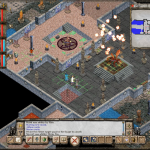 Thomas always likes to start by giving the reader an outline of what he’s about (I think because they didn’t really have tables of contents in his day). In the previous chapter, he broke the world of Christian theology down into three headings, faith, hope, and charity; now he divides faith even further.
Thomas always likes to start by giving the reader an outline of what he’s about (I think because they didn’t really have tables of contents in his day). In the previous chapter, he broke the world of Christian theology down into three headings, faith, hope, and charity; now he divides faith even further.
Faith is a certain foretaste of that knowledge which is to make us happy in the life to come. The Apostle says, in Hebrews 11:1, that faith is “the substance of things to be hoped for,” as though implying that faith is already, in some preliminary way, inaugurating in us the things that are to be hoped for, that is, future beatitude. Our Lord has taught us that this beatific knowledge has to do with two truths, namely, the divinity of the Blessed Trinity and the humanity of Christ. That is why, addressing the Father, He says: “This is eternal life: that they may know You, the only true God, and Jesus Christ, whom You sent” (John 17:3). All the knowledge imparted by faith turns about these two points, the divinity of the Trinity and the humanity of Christ.
So clearly, Thomas is first going to look at the nature of God, independent of the incarnation; and then he’s going to look at the incarnation, which is what I take him to mean by “the humanity of Christ.” Thomas was thoroughly orthodox, and no Arian. This is born out by his next statement:
This should cause us no surprise: the humanity of Christ is the way by which we come to the divinity.
Christ, at once a man and the eternal Word, is a bridge between us and God; by knowing him as man we come to know God.
Therefore, while we are still wayfarers, we ought to know the road leading to our goal. In the heavenly fatherland adequate thanks would not be rendered to God if men had no knowledge of the way by which they are saved. This is the meaning of our Lord’s words to His disciples: “And where I go you know, and the way you know” (John 14:4).
God acts, it seems, to maximize his glory; and in this case his glory is maximized if we know well what he has done for us, to bring us to happiness in heaven.
And now to business. Thomas has already said he is going to talk about the nature of God first; and now in his typical style he divides the subject further:
Three truths must be known about the divinity: first the unity of the divine essence, secondly the Trinity of persons, and thirdly the effects wrought by the divinity.
In short, God is one; God is three; and God is working.
In the next chapter we look at one of Thomas’ proofs for God’s existence. Hang on; the water is about to get deep.









